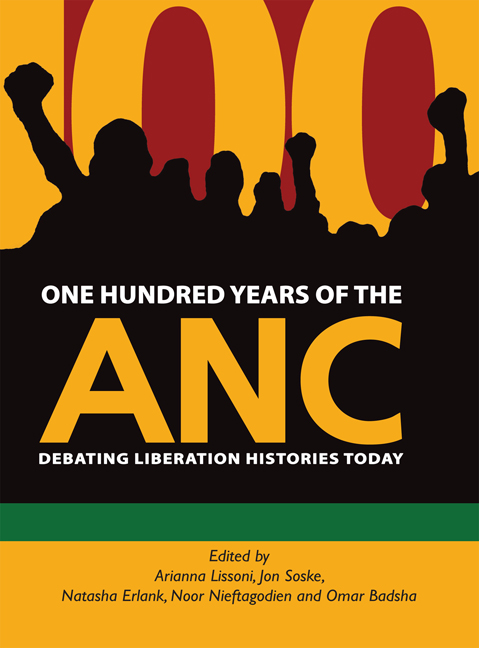Book contents
- Frontmatter
- Contents
- Acknowledgements
- Editorial Note
- FIRST KEYNOTE ADDRESS: Fragmentation and Cohesion in the ANC: The First 70 Years
- SECOND KEYNOTE ADDRESS: A Continuing Search for Identity: Carrying the Burden of History
- Chapter One One Hundred Years of the ANC: Debating Struggle History After Apartheid
- Chapter Two Religion And Resistance In Natal, 1900–1910
- Chapter Three Christianity and African Nationalism in South Africa in the First Half of the Twentieth Century
- Chapter Four Charlotte Maxeke: A Celebrated and Neglected Figure in History
- Chapter Five Imagining the Patriotic Worker: The Idea of ‘Decent Work’ in the ANC's Political Discourse
- Chapter Six Popular Movements, Contentious Spaces and the ANC, 1943–1956
- Chapter Seven Unravelling the 1947 ‘Doctors’ Pact’: Race, Metonymy and the Evasions of Nationalist History
- Chapter Eight The Politics of Language and Chief Albert Luthuli's funeral, 30 July 1967
- Chapter Nine Robben Island University Revisited
- Chapter Ten Shishita: A Crisis in the ANC in Exile in Zambia, 1980–811
- Chapter Eleven Comrade Mzwai
- Chapter Twelve Revisiting Sekhukhuneland: Trajectories of Former UDF Activists in Post-Apartheid South Africa
- Chapter Thirteen Regeneration of ANC Political Power, from the 1994 Electoral Victory to the 2012 Centenary
- Chapter Fourteen The ANC: Party Vanguard of the Black Middle Class?
- Chapter Fifteen Globalisation, Recolonisation and the Paradox of Liberation in Southern Africa
- Contributors
- Index
Chapter Seven - Unravelling the 1947 ‘Doctors’ Pact’: Race, Metonymy and the Evasions of Nationalist History
Published online by Cambridge University Press: 21 April 2018
- Frontmatter
- Contents
- Acknowledgements
- Editorial Note
- FIRST KEYNOTE ADDRESS: Fragmentation and Cohesion in the ANC: The First 70 Years
- SECOND KEYNOTE ADDRESS: A Continuing Search for Identity: Carrying the Burden of History
- Chapter One One Hundred Years of the ANC: Debating Struggle History After Apartheid
- Chapter Two Religion And Resistance In Natal, 1900–1910
- Chapter Three Christianity and African Nationalism in South Africa in the First Half of the Twentieth Century
- Chapter Four Charlotte Maxeke: A Celebrated and Neglected Figure in History
- Chapter Five Imagining the Patriotic Worker: The Idea of ‘Decent Work’ in the ANC's Political Discourse
- Chapter Six Popular Movements, Contentious Spaces and the ANC, 1943–1956
- Chapter Seven Unravelling the 1947 ‘Doctors’ Pact’: Race, Metonymy and the Evasions of Nationalist History
- Chapter Eight The Politics of Language and Chief Albert Luthuli's funeral, 30 July 1967
- Chapter Nine Robben Island University Revisited
- Chapter Ten Shishita: A Crisis in the ANC in Exile in Zambia, 1980–811
- Chapter Eleven Comrade Mzwai
- Chapter Twelve Revisiting Sekhukhuneland: Trajectories of Former UDF Activists in Post-Apartheid South Africa
- Chapter Thirteen Regeneration of ANC Political Power, from the 1994 Electoral Victory to the 2012 Centenary
- Chapter Fourteen The ANC: Party Vanguard of the Black Middle Class?
- Chapter Fifteen Globalisation, Recolonisation and the Paradox of Liberation in Southern Africa
- Contributors
- Index
Summary
And then – UN! The whole of South Africa has been shaken by the decisions of that Assembly. The decisions have had international repercussions. The main source of the upheaval which is revolutionising race relations in this country is – Durban! The centre of the Indian problem is Durban. And but for Durban there would have been no reverse for this country at the UN, and South West Africa would be our fifth Province … In Durban, the Indians (like the uprooted, war torn new European settlers) are experiencing rebirth. What of the African? May not Durban be the spring – or at least a chief actor in the story – of African Regeneration?
X [HIE Dhlomo], ‘On Durban,’ Ilanga lase Natal, 22 February 1947This chapter will explore two related questions: the influence of the South African Indian Congress (SAIC) on the transformation of African nationalist politics during the 1940s and the debate among different African political factions over ‘co-operation’ versus ‘unity’ with other non-European groups.2 The mid-1940s witnessed a series of watershed developments related to South African Indians: the revitalisation of the Indian Congress under a younger, more radical leadership, the launch of a mass campaign of passive resistance against the Asiatic Land Tenure Act, the censure by the United Nations (UN) of South Africa's treatment of Indians and the independence of India from British colonial rule. Occurring in break-neck succession, these events had an extraordinary impact on the ideas and outlook of African intellectuals, especially a new generation of younger activists associated with the African National Congress Youth League (ANCYL). At the same time, the ANC was divided over the proper response to these new circumstances. The rivalry of the Non-European Unity Movement (NEUM), the initial success of the Passive Resistance campaign and the UN decision pushed sections of the Transvaal-based ANC leadership towards a limited form of collaboration with the Indian Congress. The leadership of the Natal ANC strenuously rejected this course of action, while the ANCYL opposed all but the most circumscribed forms of occasional co-operation. Moreover, widespread resentment among Africans against Indian shopkeepers and other petty entrepreneurs, especially in Natal where the majority of Indians lived, ensured that a strand of anti-Indian chauvinism would permeate African populism.
- Type
- Chapter
- Information
- One Hundred Years of the ANCDebating Liberation Histories Today, pp. 163 - 181Publisher: Wits University PressPrint publication year: 2012



